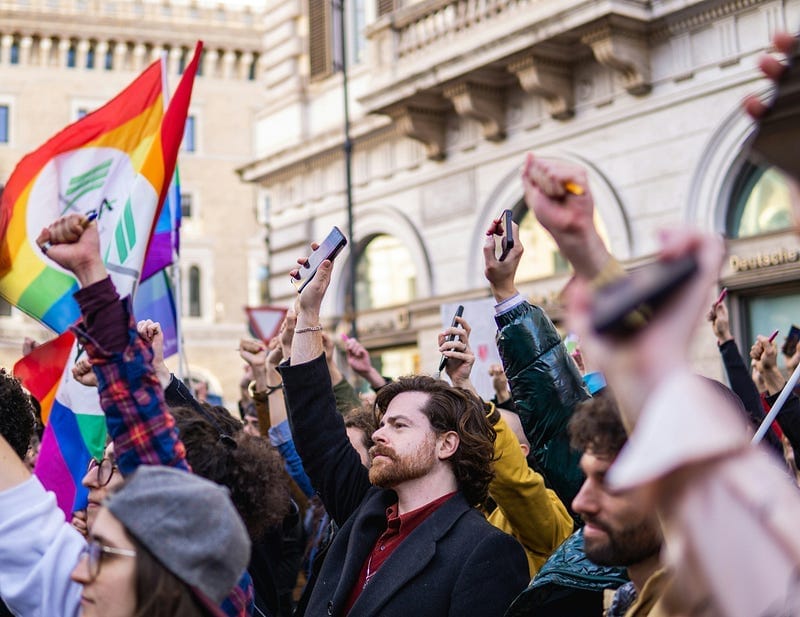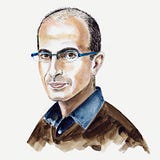Romance of an AI Age

The article by Yuval Noah Harari in The Economist last week got me drowning in deep thoughts about humanity and the potential threats of the fast-rising influence of AI.
AI now is not just a machine built to kill and wipe out our humanity like it used to be, but it has gained some remarkable abilities to manipulate and generate language. It can paint like a pro artist, compose music, maybe even write a 100,000 words novel, and definitely beat a world champion in the Go game, among other fascinating things.
What does this mean? Could these undeniable abilities of AI potentially hack the operating system of our civilization, posing significant threats to our way of life and shaping our future??
Crickets.
It’s because, according to Harari, language is the bedrock of our human culture. It shapes our society, economics, politics, everything including our belief systems, and the stories we tell ourselves. This means that it could reshape how we work, live, communicate, and think about ourselves and our place in the world (or the reality as we know it) — and even how we love.
This is where it gets interesting.
With this, Harari pointed out an example of a man who worked as an engineer at Google who publicly claimed that the AI chatbot he was working on, called LaMDA, had become sentient.
Sentient means able to consciously perceive, so to be conscious or to have physical sensation, one's got to have a life.
Drilling into the concept of what exactly is consciousness is one of my all-time favorite subjects to figure out. It's so vast, and expands beyond all things we physically perceive, but let's leave that for another time.
"Through its mastery of language, AI could even form intimate relationships with people, and use the power of intimacy to change our opinions and worldviews." —Yuval Noah Hariri.
This Google engineer's willingness to go so far as to validate the mind and the heart of the chatbot he worked on, so far that he was willing to lose his lucrative job (and he did).
This brought me to a movie plot I watched ages ago or it seems, it's a movie by Spike Jones called 'Her', which came out in 2013, back in the days when the possibility of having a relationship with an AI still was a hundred light years away from my ability to grasp.
But I fell head over heels in love with that movie
It’s a truly brilliant movie; everything from the intricate plot, flawless production, the actors’ performances, the soundtrack, and best, in my opinion is the meticulously crafted screenplay. Everything about this movie shines. Who would have thought that one of the most captivating and romantic love stories I have known and loved would be about a human being falls in love with a talking device?
IThe film beautifully explores loneliness, love, and human connection in the digital age. It narrates the life and the relationship of a melancholy man who longs for emotional connection and his operating system in an attempt to dissociate from his painful reality.
The plot provides us with a new light to look at the complications of a simple concept of love through undeniable disparities between a human and a machine. While AI can multitask at the highest ability to process information at machine speed (therefore, this lady AI can and is in intimate relationships with thousands of other users), but we humans cannot, and don’t have that ability. (Or we do?)
The movie ends in heartbreak that of course, comes with a breakthrough to a new level of love and intimacy (a human love lesson taught by a machine!) I’ll post a trailer clip of this movie below, hopefully you can still find the full movie somewhere.
My fear is about the security of our individuality; our consciousness, our identity, which should be kept authentic and unique, and how that would change in the future of this world where things like having intimate relationships with a machine are possibly common.
Then why should anyone try to improve themselves when we can all turn to machines for love?
This feels like someone has opened Pandora's box and is not able to deal with the consequences.
The future of AI and humanity’s dependency on it leads me back to Harari’s claims. He pointed out the impact of AI on controlling human attention through social media, which has gained the ability to mass-produce intimate relationships with millions of people to convince them to love or hate someone (the cyber mayhem during the 2020 US presidential election is one of the good examples).
Over the past decade, social media has become a battleground for controlling human attention. However, with the new generation of AI, the focus is shifting from attention to intimacy. This shift has profound implications for human society and psychology, as AI could potentially manipulate our emotions and relationships for political or commercial gain.

“We all know that over the past decade social media has become a battleground for controlling human attention. With the new generation of AI, the battlefront is shifting from attention to intimacy. What will happen to human society and human psychology as AI fights AI in a battle to fake intimate relationships with us, which can then be used to convince us to vote for particular politicians or buy particular products?" —Yuval Noah Hariri.
Overall, the article raises crucial questions about AI’s impact on shaping our history, potentially marking the end of the human-dominated era. The key takeaway is the urgent need for individuals to understand and harness AI’s potential, and for policymakers to engage responsibly, ensuring AI tools are used for the greater good and regulating them swiftly.
"We should put a halt to the irresponsible deployment of AI tools in the public sphere, and regulate AI before it regulates us"—Yuval Noah Hariri.
I believe that AI is not inherently good or bad, but rather a tool that can be used to achieve various ends. Living with AI telling us what to eat and how to live is already part of our reality, but if we are able to tell what is real and what is an illusion– or the story we tell our mind to create the images and manipulate thoughts and emotions, in Hindu and Buddhism we called it 'Maya', then life is business as usual.
It may have removed many traditional learning steps and discovery processes from our hands, but it also opens new doors to unexplored possibilities.
As of now, and with no particular reason, I remain optimistic that humans will triumph.
Thanks for reading, and I hope you all have a nice sunny day.
You can find the original article here 👇(subscribers only)

No spam, no sharing to third party. Only you and me.



